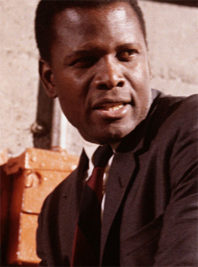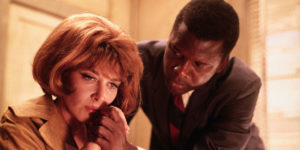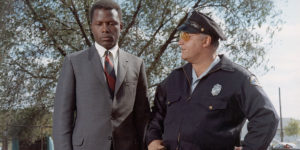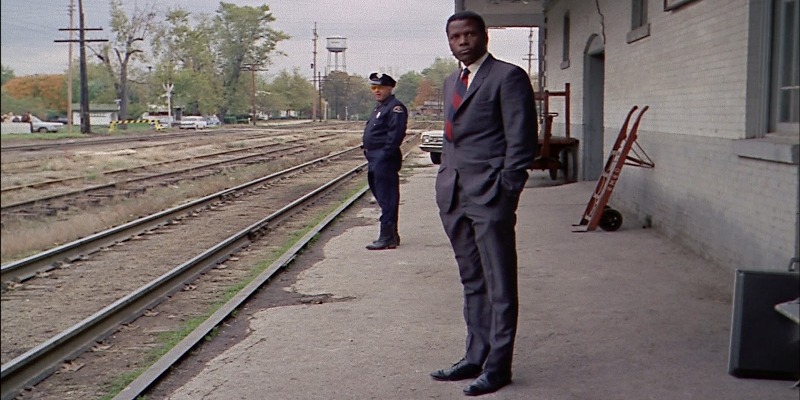
There is a tide of change sweeping over the movie business: Summer ticket sales have taken a nosedive, prominant filmmakers are migrating to TV, and theatre owners are thinking up creative ways to get people into theaters as new, cheap, and accessible entertainment options become available. At the same time, there has never been a better time to be a cinephile. With over one hundred years of cinema to draw from, more theatres and cultural institutions now offer retrospectives, themed movie nights, and master classes.
One can’t miss retrospective is Ashley Clark’s Black Star: Celebrating 100 Years of Black Excellence on Screen which runs from November 3rd to December 22nd at TIFF Bell Lightbox. The series is in collaboration with the British Film Institute and TIFF’s edition will explore “ideas of erasure, Black stardom, radicalization and the Black experience throughout time,” and “highlight the important role Black talent has played in the realm of cinema with the addition of a specially curated selection of films.”
The series kicks off Friday night with Norman Jewison’s seminal work, In the Heat of the Night. And the cherry on top, the Lightbox is running a pristine 4K Digital Restoration of the film. The team over at the Lightbox invited us over to check out an advance screening of In the Heat of the Night and let me tell you one major spoiler: It holds up.
In the Heat of the Night may just be a perfect movie. It looks stunning, tells a gripping story, and features an iconic performance from one of America’s all-time great actors. Some classic films don’t age well, and yet with its up-close look at racial intolerance, In the Heat of the Night still feels relevant and has only gotten better.
In the Heat of the Night begins as cool and collected Philly detective, Virgil Tibbs (Sidney Poitier), steps off a train into the steamy Mississippi night. The town of Sparta Mississippi is only a few hundred miles from Tibbs’ Pennsylvania home, but it may as well be a whole other planet. Sparta doesn’t share the northern state’s socially progressive values, so the sooner Tibbs can catch his connecting train out of town, the better.
After a police officer discovers a murdered body, Tibbs’ black skin makes him the town’s primary suspect. Once in custody, it’s clear Tibbs is not only innocent but that he’s the only cop in town with the skills to catch the killer. But police chief Gillespie (a gum-chewing, lip-smacking Rod Steiger) won’t have any of it. The victim’s wife (Lee Grant) recognizes Tibbs’ competence, so when she catches Gillespie giving him the bum’s rush out of town, she threatens to pull her business — and the jobs that come with it — out of Sparta unless he stays. With Tibbs back on the case, he and Gillespie form an uneasy alliance in a race to catch the killer before the hostile townsfolk catch him.
In the Heat of the Night looks and sounds stunning. Haskell Wexler’s cinematography is gorgeous and brings the town of Sparta to life. I was fixated on the way he captured the sharp glow of fluorescent lights bursting through the humid night air. Supplementing the visuals is a soundtrack crafted by the legend, Quincy Jones. And any film scored by the man who brought the world Thriller is an auditory treat.
The film begins at the leisurely pace of a sun-kissed Mississippi afternoon as Ray Charles belts out ‘In the Heat of the Night,’ one cinema’s most recognizable theme songs. It’s rare that a theme song so perfectly encapsulates a film and rarer still to have a music industry legend pour so much soul into that tune. The song, ‘In the Heat of the Night,’ is a perfect introduction to a perfect film, and one of the film’s many high points. Speaking of high points…
Sidney Poitier is the epitome of cool and his character, Virgil Tibbs, is a classy badass. I can’t imagine what it felt like for my father to see a black character carry himself with so much swagger back in 1967. Tibbs is all alone in a hayseed town, but he shows no fear, never backs down, and knows how to read a room. I get giddy watching how Tibbs hangs back and evaluates a situation, letting others try and prove themselves before he steps forward and makes them look bad.
Alternatively, as Poitier portrays Tibbs, he reveals an expression that always breaks my heart. It’s a look that too many black people know oh-so-well and once you recognize it, you’ll start seeing it everywhere. I call it the, “I should have seen this coming sooner” look. It’s a look that shows itself when despite his detective work, his eloquence, and dignified demeanour, the white people around Tibbs prove they’re only capable of judging him by the colour of his skin.
In the Heat of the Night follows storytelling’s primary rule: Show don’t tell. Jewison ensures that each character interaction plays out as a lesson in the art of subtlety. Sparta’s residents often try to “put Tibbs in his place,” asserting their will over him through conversation. Tibbs however, is too astute, and we see how the white characters’ behaviours change when Tibbs gains the upper hand.
 Though painful to watch, Jewison uses the racial tension in the film to explore the root of the characters’ hatred. Happy, successful, well-adjusted people don’t have reasons to blindly hate and we can see where Gillespie’s dislike for Tibbs comes from. Gillespie is stuck in a fleabag town, policing a bunch of bumpkins and it eats at him that a black man is smarter than him, doing his job better than him, and making more money than him. Tibbs threatens Gillespie because he represents an idealized version himself: A fastidious detective who is clever, eloquent, classy, and successful. Dealing with a man who achieved greater success with a fraction of Gillespie’s privilege is the ultimate smack in the face. We can see where the resentment comes from.
Though painful to watch, Jewison uses the racial tension in the film to explore the root of the characters’ hatred. Happy, successful, well-adjusted people don’t have reasons to blindly hate and we can see where Gillespie’s dislike for Tibbs comes from. Gillespie is stuck in a fleabag town, policing a bunch of bumpkins and it eats at him that a black man is smarter than him, doing his job better than him, and making more money than him. Tibbs threatens Gillespie because he represents an idealized version himself: A fastidious detective who is clever, eloquent, classy, and successful. Dealing with a man who achieved greater success with a fraction of Gillespie’s privilege is the ultimate smack in the face. We can see where the resentment comes from.
Countless films have tackled the racial tension in the south between blacks and whites but few films have done so with the insight and precision of In the Heat of the Night. Jewison isn’t content to merely track a black man’s journey through a racist town, instead, he chooses to burrow down to the roots of racial tension and delivers a level of emotional texture that few films can match. Tense, atmospheric, and featuring superb performances, In the Heat of the Night is a cinematic masterpiece and essential viewing for anyone who considers themselves a lover of film.
- Release Date: 11/03/2017


